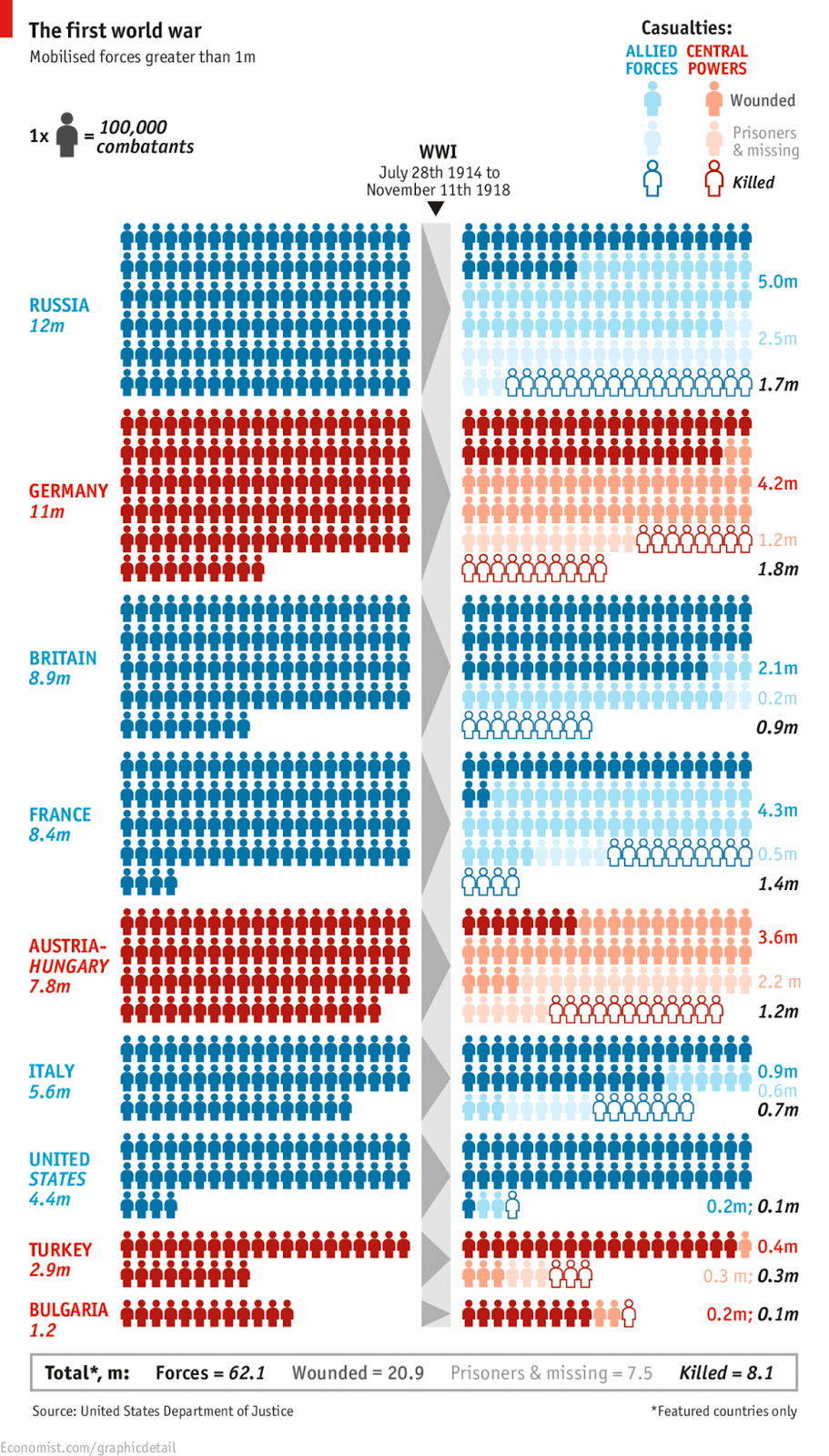100 years ago today, Europe was embroiled in the First World War. Four years later, or 96 years ago today, the guns fell silent. The Economist showed the terrible price paid by each of the major combatant nations.

The necessity for Europe
I reiterate my comment about the necessity that created the European Union (see Lest we forget, or why you don't understand Europe):
So is it any wonder that after the carnage of the First World War and the Second World War, the countries of Europe came together and said, "Enough!"
Thus, the EEC and later the EU was born. Today, that project has largely succeeded. We have seen no major European conflict since 1945, the end of the Second World War. The formation of the European Union has kept the peace. The political elite of Europe, despite all the bickering, are still committed to that bigger than life myth of the formation of the EU.
For overseas analysts who look at Europe and only focus on the cost of bailing out Greece, Portugal, etc. Don`t ever forget the political glue that holds Europe together.
Lest we forget.
Canada's lack of the sense of Volk
Margaret Wente, writing in the Globe and Mail, had a brilliant insight about Canada and war:
Our identity is not defined by blood, or by our sense of destiny. We have no concept of Volk. We’re just folks. We don’t care who you are or where you came from or who or what you worship, as long as you share our good Canadian bourgeois values. Don’t litter. Send your kids to school. Wear a poppy.
Even though the European elite understands very well the historical necessity of binding Germany and France together so that another major war cannot happen again, they are held back by Europe`s sense of Volk. That seems to be underlying reason for the failings of the euro - the economic union without political union.
Wente`s remarks were especially poignant in the wake of the attack in Ottawa that killed a Canadian soldier, Cpl. Nathan Cirollo of Hamilton:
If you haven’t seen it yet, there’s an amazing video you should check out online. It was made a week after the attack on Parliament. In it, a York University student named Omar Albach and two friends set out to gauge people’s attitudes toward Muslims. They took their experiment to the streets of Hamilton, on the eve of Cpl. Cirillo’s funeral, where emotions were running high. One friend was dressed in a traditional Muslim robe; the other played an Islamophobic bigot. They wanted to see whose side people would take.
What they got wasn’t quite what they expected.
As the bigot berates the Muslim, the passersby get mad. “You can’t stereotype and judge people by their clothes,” one man says heatedly. “Or their nationality or anything else, you know what I mean?”
One woman tells the bigot that what happened to Cpl. Cirillo was “awful and tragic,” then says “I don’t think that’s any reason to persecute someone just because of what they’re wearing.”
You’ve gotta love the crowd. They’re pure Hamilton. Tim Hortons drinkers, guys in flannel shirts and baseball hats. The video ends abruptly when a bystander punches the bigot in the nose.
The video went viral, nearly three million hits as I write this, and made news around the world. Mr. Albach, the 18-year-old director, was interviewed on CNN. Watch: Canadians Stand Up To An Anti-Muslim ‘Bigot,’ said an admiring Washington Post headline. People in Saudi Arabia sent the link back to friends in Canada.
The surprise is the degree of acceptance of the enemy du jour, namely Muslims:
Shortly after the attack on Parliament, the mosque in Cold Lake, Alta., was vandalized. People arrived for Friday prayers to discover that someone had thrown a brick through a window and sprayed the words “GO HOME” across the front of the building.
Here’s what happened next. As soon as word got out, townspeople showed up with scrub brushes, paint remover and flowers. They made new signs with Canadian flags saying “You are home.” Local contractors showed up, along with soldiers in uniform from the nearby military base. Ajaz Quraishi, president of the Islamic Society of Cold Lake, said he didn’t think the incident had anything to do with hostility in the community. “Maybe kids did it, I don’t know who did it, but it could happen to anybody,” he told the Edmonton Journal. “… One guy came up and said, ‘You know, I’m a redneck, but I don’t like this.’ He came and hugged me.”
There are reasons to be optimistic about Europe. Yes, it is struggling with the centrifugal forces of localized identities. Another challenge has been the flood of immigrants and refugees from North Africa, whose Muslim identities rub the locals the wrong way. Yet, even at the nadir of the Scottish Referendum when it appeared that Scotland might succeed from the UK, the centripetal of Europe held together as Scotland showed that it wanted to be part of the EU and acknowledged its European identity.
Maybe the most realistic solution is for Europe become more like Canada, a country held together in a federation, composed of regions with strong provincial powers.
Disclosure: Cam Hui is a portfolio manager at Qwest Investment Fund Management Ltd. ("Qwest"). This article is prepared by Mr. Hui as an outside business activity. As such, Qwest does not review or approve materials presented herein. The opinions and any recommendations expressed in this blog are those of the author and do not reflect the opinions or recommendations of Qwest.
None of the information or opinions expressed in this blog constitutes a solicitation for the purchase or sale of any security or other instrument. Nothing in this article constitutes investment advice and any recommendations that may be contained herein have not been based upon a consideration of the investment objectives, financial situation or particular needs of any specific recipient. Any purchase or sale activity in any securities or other instrument should be based upon your own analysis and conclusions. Past performance is not indicative of future results. Either Qwest or Mr. Hui may hold or control long or short positions in the securities or instruments mentioned.
